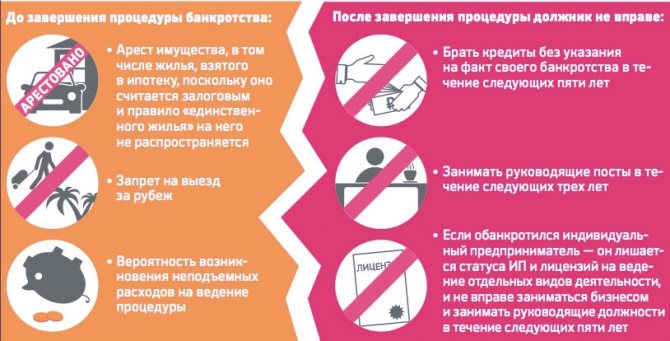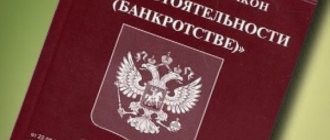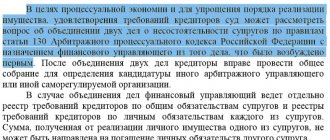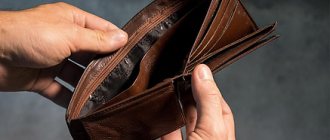How to write off debts through bankruptcy of an individual if there is no property? Since the fall of 2020, citizens have two options: judicial and extrajudicial bankruptcy. But first you need to figure out whether the debtor really has no property.
Source: shutterstock.com
Citizens without legal education often do not understand whether they have property. Property registered in the name of a spouse is not mistakenly considered to be one’s own. There are often cases when shares in authorized capital are not taken into account in principle.
Alexey Zhumaev
financial manager
There are also those who do not know whether the apartment in which they live belongs to them. Or is it social rent? And what will happen to her in bankruptcy?
Is bankruptcy possible if there is no property and income?
If an individual does not have property, writing off debts through insolvency is permitted. 127-FZ on bankruptcy of citizens was amended on September 1, 2020, which directly states that it is possible to go bankrupt without property.

Federal Law No. 289 of July 31, 2020
If a citizen does not have property, he can submit:
- for out-of-court bankruptcy
, when the total debts are less than 500 thousand rubles, and at least one debt is verified by bailiffs. If the enforcement proceedings are closed under Part 4, Clause 1. Article 46 of the Federal Law on Enforcement Proceedings, and the bailiffs have not opened new cases - a citizen can write off debts for free at the MFC. - for judicial bankruptcy
if out-of-court bankruptcy is not suitable. The debts are more than half a million, or the bailiffs do not want to finish the proceedings.
We described how out-of-court bankruptcy works in this article.
The question of whether a debtor who has decided to file for bankruptcy has property is rather dubious. Most borrowers have already sold everything they could in order to pay off their debts. Some were seized by bailiffs during enforcement proceedings. Household appliances and gold jewelry are already a luxury for many debtors.
Thus, citizens who do not own property often apply for bankruptcy.
What do you mean there is no property, but an apartment, a laptop, a phone?
Property refers to property that can be seized and sold to settle accounts with banks.
But the law defines property that is not included in the bankruptcy estate and is not subject to sale in bankruptcy! Such property includes:
- An apartment or house that is the only one for the debtor. For example, a person lives with his family in a city apartment. There is no other real estate. Accordingly, the apartment will be considered the only housing and cannot be seized for settlements with creditors.
- Household items in the apartment: furniture, appliances. That is, no one will take the last thing out of the apartment in order to sell it in order to pay off the claims of creditors.
- Agricultural items, livestock. He has no right to confiscate outbuildings, sheds, livestock, seeds for sowing, tools for cultivating the land, and so on. This is important for debtors who live in rural areas to know.
- Personal items, jewelry.
- Tools and means for work.
If you own the items listed above and there are no other assets, it will be considered bankruptcy without assets. A person has the right to apply to the Arbitration Court or the MFC, regardless of social or labor status: student, working, unemployed, fired at his own request or due to layoff, pensioner has the right to write off debts under Law No. 127-FZ.
Legal consequences of declaring a citizen bankrupt
If during the insolvency proceedings it was possible to implement one of the prescribed procedures, then the debtor is officially declared bankrupt. The features of the status are discussed in Art. 213.30 Federal Law.
For 5 years, it will not be possible to issue loans without concealing the fact that a bankruptcy procedure has taken place. This means that most likely no one will lend money to a person. Because the risks are too great. If a person has already once found himself in a situation where it was not possible to repay the debt, then there is no guarantee that this will not happen again.
If some financial organization wants to provide funds to a bankrupt, then most likely it will be on the most unfavorable terms: at a high interest rate with collateral or guarantors.
You cannot initiate bankruptcy proceedings again for 5 years. That is, if a person again experiences a difficult financial situation, he will not be able to get rid of debts by filing a bankruptcy petition in court. Interest and penalties will continue to accrue. In general, the person will find himself in a very unpleasant situation. A bankruptcy case, if 5 years have not passed since the implementation of the previous procedure, can be initiated by creditors. But the law directly states that you should not count on complete relief from debts.
You cannot hold leadership positions in legal entities for 3 years.
You cannot manage a credit institution for 10 years. This limitation, like the previous one, is quite logical. How can a person who has been declared bankrupt be allowed to manage a company?! It is obvious that such a person either does not know how to act competently in the financial sector, or is indifferent to various negative consequences that arise or may arise.
For 5 years you cannot participate in the management of insurance companies, pension funds, mutual funds, and so on.
In general, the consequences of declaring an individual bankrupt are not so terrible. It is quite possible to live a normal life: work and receive a salary that no one will take away. But it’s better not to take risks, not to take out new loans. It is possible to go bankrupt again, as stated, only after 5 years.
This is all about the negative side of the issue. But there are also positive consequences of bankruptcy of an individual. If the property was sold, but the proceeds were not enough for all creditors, then the debtor is officially released from the obligation to repay the debt. Almost the entire amount, with rare exceptions that will be discussed later, is forgiven.

How to check ownership of property
The presence of property is confirmed by documents. Thus, ownership of residential premises is certified by a certificate of registration of ownership rights or an extract from the Unified State Register of Real Estate.
If you cannot say for sure whether you are the owner of real estate, check on the official website of Rosreestr. You can also request an extract on the rights of an individual to real estate - through State Services or at the MFC. It provides complete information about apartments, houses, land plots, residential and non-residential premises, etc. that belonged and previously belonged to you individually and on the right of shared ownership.
The right to movable property (motorcycle, car, special equipment, air and water transport) is confirmed by a registration certificate and vehicle passport.
You should pay attention to the property of which your spouse is registered as the owner. If you received an inheritance together with your brothers/sisters, a part also belongs to you, do not forget about shared property.
Alexey Zhumaev
financial manager
In the absence of prenuptial agreements, the second spouse has ½ share of everything acquired (bought, built, earned or created) after the wedding. Article 34 of the RF IC contains a detailed list of common property and indicates that a spouse who cared for children or did housework is not deprived of the right to half of the jointly acquired property. The fact of registration for only one spouse has no legal significance.
Why is it important to determine the fact of ownership of property?
If you have property, it will be sold during bankruptcy. It is important to weigh the pros and cons. It is necessary to understand that property in bankruptcy proceedings will be included in the bankruptcy estate and sold.
This is especially important in out-of-court bankruptcy. If a person filed for extrajudicial bankruptcy at the MFC, and the bank found out that the person owns, for example, a dacha together with his wife. The joint property is registered in the name of the spouse, so the bailiff did not see this property. But the bank does not want to lose money - it will appeal to the Arbitration Court with objections regarding extrajudicial bankruptcy.
The court will terminate the out-of-court case and introduce a restructuring procedure. Moreover, the bank will select a financial manager. As a result, the dacha will be sold, the wife will be paid half of the proceeds, and the other half will be paid to the creditors.
So, due to several loans, you can lose your property if you do not check your assets. When preparing for bankruptcy, it is important to analyze the situation, highlight the common and personal property of the borrower.
Bankruptcy of an individual due to the inability to repay loans is a common reason for applications. It is not without reason that personal bankruptcy of citizens has already been dubbed “consumer bankruptcy.”
Cost of personal bankruptcy
Let us remind you that if you decide to go through the bankruptcy procedure yourself, then the cost of bankruptcy consists only of mandatory payments:
- state duty 300 rubles;
- services of a financial manager - 25,000 rubles;
- payment for publications in the EFRSB - 430 rubles. 17 kopecks for each, at least 10 in total;
- advertisement in the Kommersant newspaper - from 10,000 (depending on the length of the text), at least 2 times.
Our services
Submitting an application and documents to the Arbitration Court - 10,000 ₽
Participation in the first court hearing - 5,000 ₽
Sale of property or bankruptcy on a turnkey basis - from 7,990 ₽/month.
We've detailed the costs here. The price of bankruptcy without property in Moscow is from 80,000 rubles.
How to go bankrupt if you have no money? Borrow or ask relatives to pay.
Extrajudicial bankruptcy is recognized free of charge at the MFC if the amount of debts is less than 500 thousand rubles.
Contract of sale
Complexity: 4/5
Preparation cost:
- fees for notarization of the contract - 0.5% of the value of the property being sold under the contract, but not less than 300 rubles. and no more than 20,000 rubles
- State duty of Rosreestr for registration of a real estate transaction - 2000 rubles
With whom it is concluded: with anyone, but ideally a non-affiliated buyer is needed
How it’s done: Vasya decides to sell his mansion. By “sell” we mean concluding a contract, registering the mansion in the name of the buyer and arranging the circulation of money in nature. The deal is made with the brother. The mansion's market value is estimated at 30 million, and is sold for 10. The money is transferred in cash.
These are the top mistakes when concluding a policy. Moreover, in addition to the affiliation of persons, the fact that Vasya’s brother works as a mechanic at a factory with a salary of 40 thousand per month will play a role. Where did he get 10 lyams for a mansion, despite the fact that he still lives and is registered with his mother?
If you need an example, leave your e-mail and we will send you court practice on the use of PrEP:
Opinion: This is one of the most popular ways to protect assets. And also costly, because you have to spend real money. At the same time, the policy can be challenged on a number of grounds, and each of them needs to be examined under a magnifying glass. In short, it is important to remember the following rules:
- if the transaction is with an affiliate, it is important to prove the buyer’s solvency and the existence of a real transfer of money;
- If the property was sold at a reduced value, it will be important to provide evidence that the price was justified. For example, the roof of the mansion was leaking, there was no plumbing, and the gas pipeline had not yet been installed;
- if there was no real transfer of money...oh, it’s better not to do that, but if you do, you need to bother so that it is on paper with a further explanation of where the money came from and the buyer and where it went from the seller. For example, the money came in cash, and that’s how much went to the children, that’s how much to live on, but that’s how much good Vasya paid to the creditors.
Read more about the purchase and sale transaction here.
How is bankruptcy carried out if there is no property, but there is a job?
Extrajudicial bankruptcy if you have a job is unlikely, so we are talking about bankruptcy through the Arbitration Court.
In a judicial procedure, the receipt of money and expenses of the debtor are controlled by the financial manager. Wages are no exception. After the start of the property sale procedure, all accounts are closed, the financial manager opens a special account where the accruals are received.
There are no fundamental differences between bankruptcies where the debtor has no income and those where the debtor receives a salary. The same procedures are being introduced, the same activities are being carried out. But there is an important nuance - the debtor can apply for the allocation of a living wage from his income to support himself and his dependents
(for example, minor children).
In Moscow, the cost of living for one adult is now about 18,000 rubles, for a child - 12,000 rubles. Thus, the debtor can receive 30,000 rubles monthly while the bankruptcy procedure lasts.
Important!
There are a number of payments that are not subject to collection. This includes unemployment benefits, alimony payments, social benefits (for example, for disability). They are not included in the bankruptcy estate; during bankruptcy, the debtor will continue to receive and use them.
Consequences of starting personal bankruptcy proceedings
The bankruptcy procedure of an individual is initiated by filing an application with the appropriate arbitration court:
- debtor;
- creditor.
The justice body considers a request to declare a person bankrupt and makes a decision on it. If the application is recognized as justified, then the financial manager comes into play, who acts as a person who controls and limits the activities of the person - a potential bankrupt. Thus, when a personal bankruptcy application is recognized as justified, a number of restrictions are introduced. They are discussed in Art. 213.11 Federal Law.
The debtor is prohibited without the consent of the financial manager:
- Alienate and acquire property whose value exceeds 50 thousand rubles.
- Issue and receive loans, assign and acquire claims by assignment, become a guarantor - in general, participate in debt relations.
- Pledge property.
- Become a member of various societies and partnerships.
- Manage your own accounts and deposits.
The law allows a citizen who is a potential bankrupt to open a special account and carry out financial transactions using it in an amount not exceeding 50 thousand rubles per month. It is possible to petition the court to increase this limit.
Thus, the debtor, if the bankruptcy application is recognized as justified, is almost completely deprived of financial independence. Control is established over all operations and transactions by the financial manager.
But there are also positive consequences of bankruptcy:
- interest, penalties, fines and penalties cease to accrue on debts;
- the seizure of the property is lifted.
However, the latter, in fact, does not give the debtor any advantages. For example, if the seizure of an apartment is lifted, it will still be possible to sell it only with the consent of the financial manager. And the proceeds will most likely be received by the creditor to pay off the debt.
How will bankruptcy be carried out if the borrower does not have property, but the husband or wife does?
According to the provisions of the Family Code of the Russian Federation, the regime of joint ownership applies in marriage. That is, property acquired during the years of marriage belongs to both spouses, and in the event of bankruptcy of either of them can be sold.
For example, if a car and a summer cottage were purchased during marriage and were registered in the name of the debtor’s spouse, then in bankruptcy they are included in the bankruptcy estate. It does not matter to whom the joint property is registered - in case of bankruptcy it will be sold.
But creditors are not interested in property that went to the bankrupt’s spouse, say, by inheritance or as a result of a deed of gift. It is considered the personal property of the second spouse, and in principle is not included in the bankruptcy estate.
Marriage contract
Complexity: 3/5
Cost: notarization of the marriage contract - 500 rubles
Who is it with: spouse
How it’s done: Vasya takes his beloved Katya by the hand and signs a marriage contract (BD) with her, according to which all property acquired during the marriage will go to Katyusha. And then he files for bankruptcy. And this is a failure.
Even the Family Code takes into account that there must be an equal division of property between spouses. 50/50 is excellent, it works both with and without a database. But then there is no point in using the database.
60% to the spouse, 40% to the debtor - no longer worth it.
70% to 30% and above - the marriage contract will definitely be challenged.
Opinion: For the database to actually start working, it needs to be concluded and divorced.
The fact is that the statute of limitations for challenging the database begins to be calculated only from the moment of official divorce - after all, it is at this moment that the actual division of property occurs and one of the spouses may realize that his rights have been infringed.
If you need an example, leave your e-mail in the form below.
At the same time, it would be good to conclude a BD not one day before filing a divorce application. Then it can take into account both the actual assets and those that will appear in the future. And when this property appears, get a divorce safely.
If the division of property is also organized with a show in the form of a trial, it’s absolutely beautiful. When Vasya ends up in bankruptcy, there will be +1 argument in favor of the fact that the division of property took place according to the law and this was certified by the court. But this is already serious aerobatics, which requires temporary resources.
Read more about the prenuptial agreement here.
How to go through bankruptcy as quickly as possible and with minimal consequences?
You can go through bankruptcy:
- with legal support;
- on one's own.
We recommend the second method only to those debtors who have free time, who do not have and did not have property to sell, and who understand the intricacies of legal proceedings.
It is important to take into account that in bankruptcy, the good faith of the borrower matters. If the court suspects that the bankruptcy is fictitious and deliberate, the case will drag on. It is important that the debtor:
- correctly compiled the application, indicating a complete list of property;
- had no hidden assets;
- provided data on all transactions concluded in relation to property over the past 3 years.
Summarize:
Bankruptcy of individuals if there is no property is possible. With a debt of up to 500 thousand, the MFC will write off debts free of charge if the debtor has been checked by bailiffs. Judicial bankruptcy requires expenses, but is more reliable, since your financial manager will handle the matter.
If you have doubts about the composition of your property, or need help in preparing for bankruptcy, collecting documents and certificates, call us or write online! We will tell you what to do for free!











